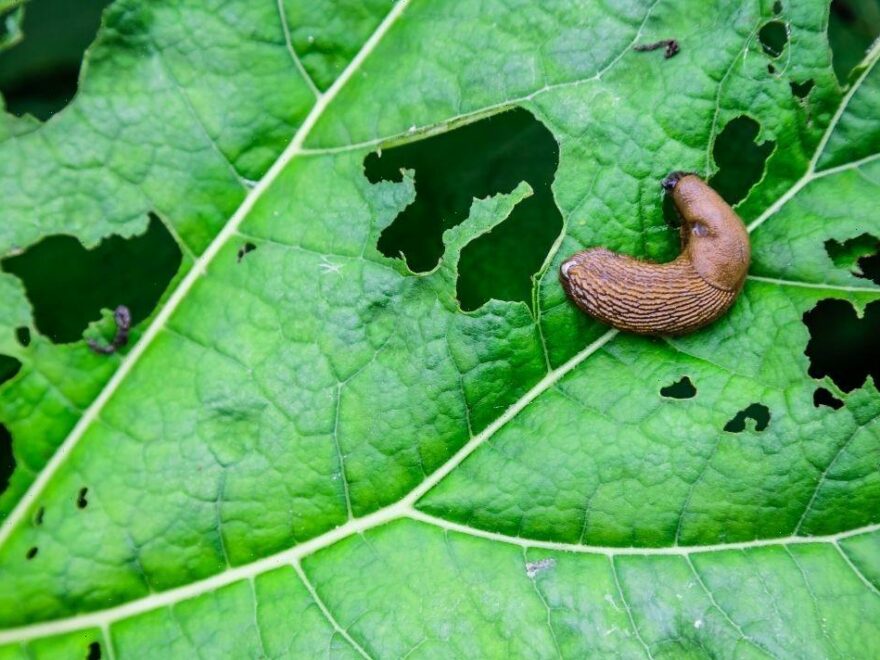Clodagh McKenna reveals tip for getting rid of slugs
We use your sign-up to provide content in ways you’ve consented to and to improve our understanding of you. This may include adverts from us and 3rd parties based on our understanding. You can unsubscribe at any time. More info
Slugs can cause problems in the garden including eating leaves, stems, flowers, tubers and bulbs. They can cause havoc throughout the year, unlike snails which go dormant during the winter months. However, it is new seedlings and young plants which are most at risk, and gardeners should take steps now to protect their outdoor spaces.
James Partridge at Greenshop said: “While you might think of slugs and snails as greedy predators feasting on your veg patch, it’s important to remember that these pesky bugs are also prey for lots of other garden wildlife, including birds, frogs, toads, hedgehogs and even certain beetles.
“So, by encouraging more of these creatures to visit your garden, you can control slugs and snails naturally.
“Birds will be enticed into your garden by a feeder or bird table with some seed or nuts mix.
“This also provides a vantage point where birds can spot their prey, so try to position it near the plants you want to protect.

“You can also consider adding a pond to provide a haven for frogs and toads. While encouraging predators is effective, it can take a bit of time to work.”
If the pests are eating and causing damage to plants and seedlings in the garden, it might be worth implementing physical barriers.
This includes horticultural wool which can be laid around the plant to deter slugs. The expert said: “They’ll struggle to move over the dry, fibrous texture.
“They also struggle with sharp or rough textured surfaces, so adding some crushed eggshells or gravel mix around the base of your plants can act as a barrier.”
DON’T MISS:
Mum shares 9p ‘trick’ to remove and prevent black window sealant mould [COMMENT]
Effective ‘tea bag’ hack to stop cats using your garden as a toilet [EXPERT]
Household staple to kill moss on paving with ‘no scrubbing’ [INSIGHT]
What’s more, the calcium from the shells will help to enrich the soil as they decompose, helping the garden to thrive into spring.
Eggshells will only act as a deterrent for slugs when they are dry and it is important to note that they will lose their effectiveness if it rains.
This means gardeners should keep an eye on the weather to make sure they are using them when it is unlikely to rain for a few days.
The gardening expert added: “If you’re getting really fed up, picking pests off and moving them.

“Slugs and snails tend to be most active around dusk, when their natural predators aren’t around. So, this is a good time to get out and pluck them off your prized plants.
“Pop them into a container and move them to your compost heap, where they can munch on old cuttings instead.”
Experts at Rentokil recommended creating a beer trap using a plastic cup and a bottle of beer. It is believed that slugs can’t resist the smell of beer due to its yeasty composition.
The pros said to half bury the cup in the soil close to the plants you want to protect and half fill it with beer.

They explained: “Tempted by the smell of beer, the slugs will fall into the cup. It is worth noting that this home remedy is only effective for a small slug problem.”
This is because the beer will likely need replacing every day which can prove to be expensive. For large infestations, the use of copper is believed to be a good remedy.
The pest control experts said: “Copper is considered to be a natural slug repellent as the mucus they secrete from their body (their slime) reacts with the metal, producing a tiny electric shock.”
Gardeners can purchase some self-adhesive copper tape which can be placed around the rim of plant pots.
For it to remain effective for a long period of time, it needs to be cleaned regularly with white vinegar to avoid it tarnishing.
Source: Read Full Article
